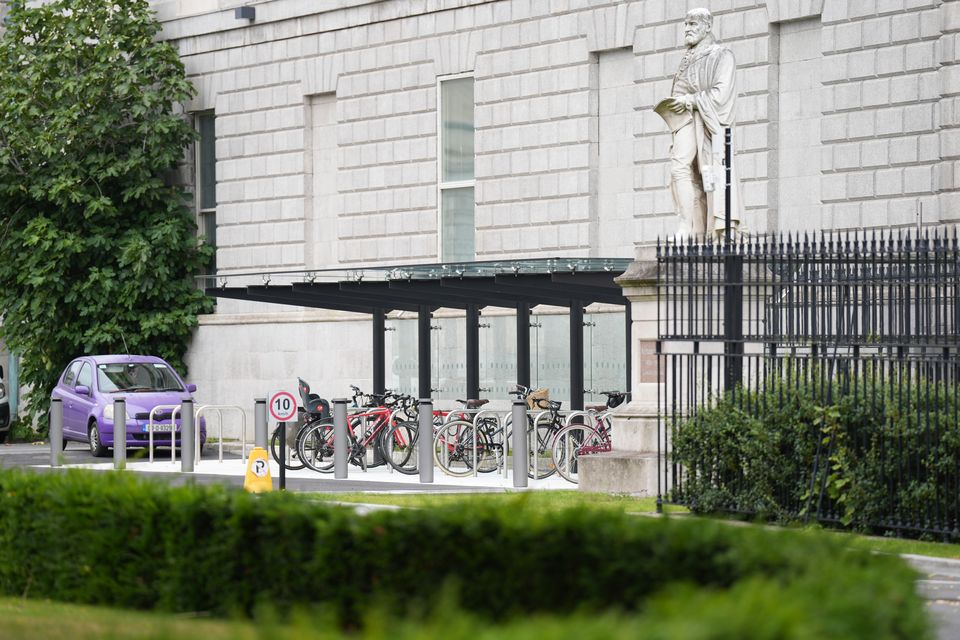The final cost of the Leinster House bike shed is likely to rise to allow for the completion of the power and charging facilities for electric bikes (e-bikes), a committee has heard.
Officials from the Office of Public Works (OPW) appeared before the Oireachtas Finance Committee to answer questions about the high costs of the bike shelter.
The OPW has come under security for spending 336,000 euros on the glass-covered shelter, located on the grounds of Leinster House.
A breakdown of the costs from the OPW shows 121,194.29 euro alone was spent on manufacturing, supply and installation.
The chair of the OPW, John Conlon, said that cost of the bike shed is “completely not acceptable”, adding that the OPW will “seriously reflect” on the “extraordinary cost” of building the shelter.
The original specification for the bike shelter, which can store 36 bikes, included e-bike charging points, however, the points are not yet in operation.
OPW head of Heritage and Capital Works, Rosemary Collier, said: “The lights are installed in the bollards and the full power … there are 36 power boards in the floor of the granite to charge 36 bikes in the future.
“They can’t be operational now because you can’t certify charging for e-bikes now in the vicinity to the National Gallery.
“So, it’s all to do with building (regulations) and certification of charges for e-bikes at the moment, but in time, it’s future proof, so that power and charging for e-bikes can be installed in the future.”
Green Party Senator Marie Sherlock said: “So the 336,051 figure is not the final figure for this bike shelter. There’s going to be additional costs in terms of making that operational future, in terms of getting the fire certs and all of that.”
Ms Collier said that it would be a fairly minimal cost.
“You’re talking about just putting in the individual power bollards for the physical charging of the bikes. It would be a fairly minimal charge,” she added.
Sinn Fein finance spokesperson Pearse Doherty asked whether the bike shed is a waste of taxpayers’ money (Brian Lawless/PA)
“All the expensive work is putting in your electrics and that’s all future-proofed.”
During the committee hearing, Sinn Fein TD Pearse Doherty asked the chair whether he believes the bike shed was a waste of taxpayers’ money.
Mr Conlon said that the construction of the bike shelter came “at a very expensive cost”.
“I don’t accept it was a waste of taxpayers’ money. I do accept it was very, very expensive,” the chair added.
Mr Conlon, who was appointed to the chair in April and was not in the role at the time of the commissioning of the project, said that he “would certainly” have raised questions about the costs.
He said he would have been “very uncomfortable” about the costs and would have questioned it.
“I would think at that stage, I would have asked for re-scoping of the project,” he added.
“The team that delivered this project had regard to the processes and procedures in place. What they did not have regard to was a judgment call when they saw the cost arising.
“I would point to what I have identified as the weakness in that process. I think the business case could have been stronger, and I think regard to the cost at that early stage, should have been more upfront.”
Aontu leader Peadar Toibin told the committee that the issue of the cost of the bike shed is “not unique”.
“The bike shed, the Gucci bike shed, is simply a tip of the iceberg in relation to Government waste, in relation to public delivery of infrastructure, and that’s really damaging for citizens, because we’re incinerating hard earned taxpayers’ money,” he said.
“Also we have a situation where the delivery of infrastructure is grinding to a halt so people can’t consume that infrastructure that they need. The bike shed is emblematic of all of that.”
Finance Committee chairman John McGuinness said the blame rests firmly with the Oireachtas Commission – which oversees the running of the houses – for not conducting its business properly.
He also accused the OPW of “recklessly spending” the public’s money adding: “There’s a culture there that stinks.”
Ms Collier said it was a “weakness” that the Oireachtas Commission was not presented with costs when they were presented with and signed off on the project.
Mr Conlon told Mr McGuinness: “The House of the Oireachtas Executive and Commission should be informed regularly at the cost of projects.”
Following its review, the OPW said it will now oversee and approve works costing more than 200,000 euro.
It also emerged from the review that an alternative bike shelter location within the grounds of Leinster House would have been more cost-effective.
The OPW told the commission that its “preferred option” was to install bicycle parking outside the Members’ Restaurant.
However, the commission later said that the provision for covered or uncovered bicycling parking in that area was not “an acceptable” proposition.
A breakdown from the OPW review shows 121,194.29 euro was spent on manufacturing, supply and installation; 52,886.84 euro was spent on groundworks including drainage and resurfacing; while the cost of granite landscaping amounted to 44,940 euro.
A total of 30,468.69 euro was spent on dayworks, with almost 35,000 euro costs related to preliminaries and agreed variations.
In the report, published on Wednesday, Mr Conlon said: “As accounting officer for the OPW I acknowledge that, while the costs for this project can be explained, the overall cost of delivering a covered bicycle shelter at Leinster House is completely not acceptable in the wider context of value for money and value for the taxpayer.
“It is an extraordinary cost for the provision of a covered bicycle parking facility and one which the OPW has to seriously reflect on.”
Mr Conlon said he has also sought an external audit of the project.
“I am also asking that the external auditor advise me on any further measures that the OPW should consider to strengthen the delivery of value for money on such projects,” he added.
“I will introduce an additional step in our governance process whereby all projects between 200,000 and 500,000 euro must have an initial cost and VfM (value for money) assessment and be presented to the relevant management board member for approval to proceed.
“Approval/financial thresholds for all grades will be reviewed and revised downwards.
A view of the bike shelter at Leinster House, Dublin (Niall Carson/PA)
“The value of this elective project should also have been communicated to the members of the Houses of the Oireachtas Commission (HOC) so that the costs could be considered and fully understood.
“Governance and reporting on works that are requested by the HOC, that is elective works, need to be strengthened and needs to have regard to value for money on a project-by-project basis.
“Therefore, the costs of elective works projects requested by the HOC will be provided to the monthly HOC meetings commencing from Monday September 23.”
Mr Conlon said the OPW assessed the requirements, the conservation challenges and the complexity of the bike shed design, and a “simple assessment” was undertaken as required by the Public Spending Code.
However, he added the assessment should have placed a “greater emphasis” on the value for money aspect of the project.
“A total project cost (which includes archaeology, contract fees, construction costs and contingency) was estimated at 350,000 euro (ex-VAT) following a review of the design,” he added.
“This maximum total project cost was set by the relevant officer within the defined OPW financial thresholds.
“I am concerned that this level of expenditure is not consistent with the scale of the project under consideration – a covered bicycle facility.”

